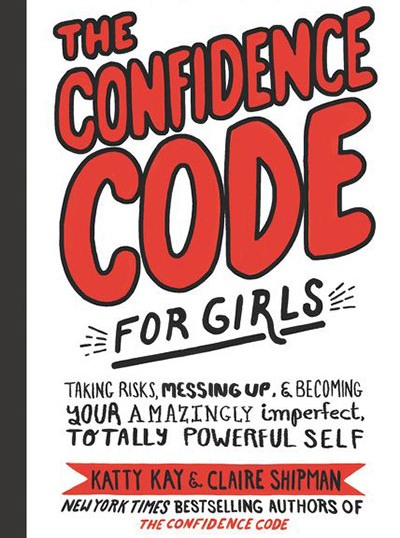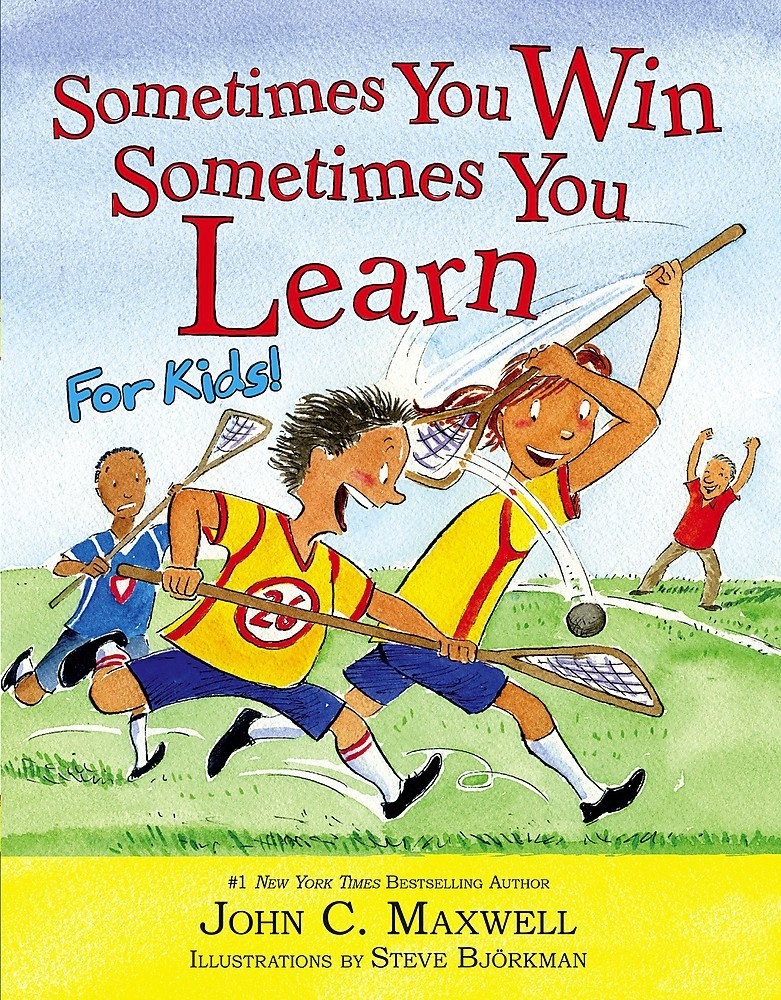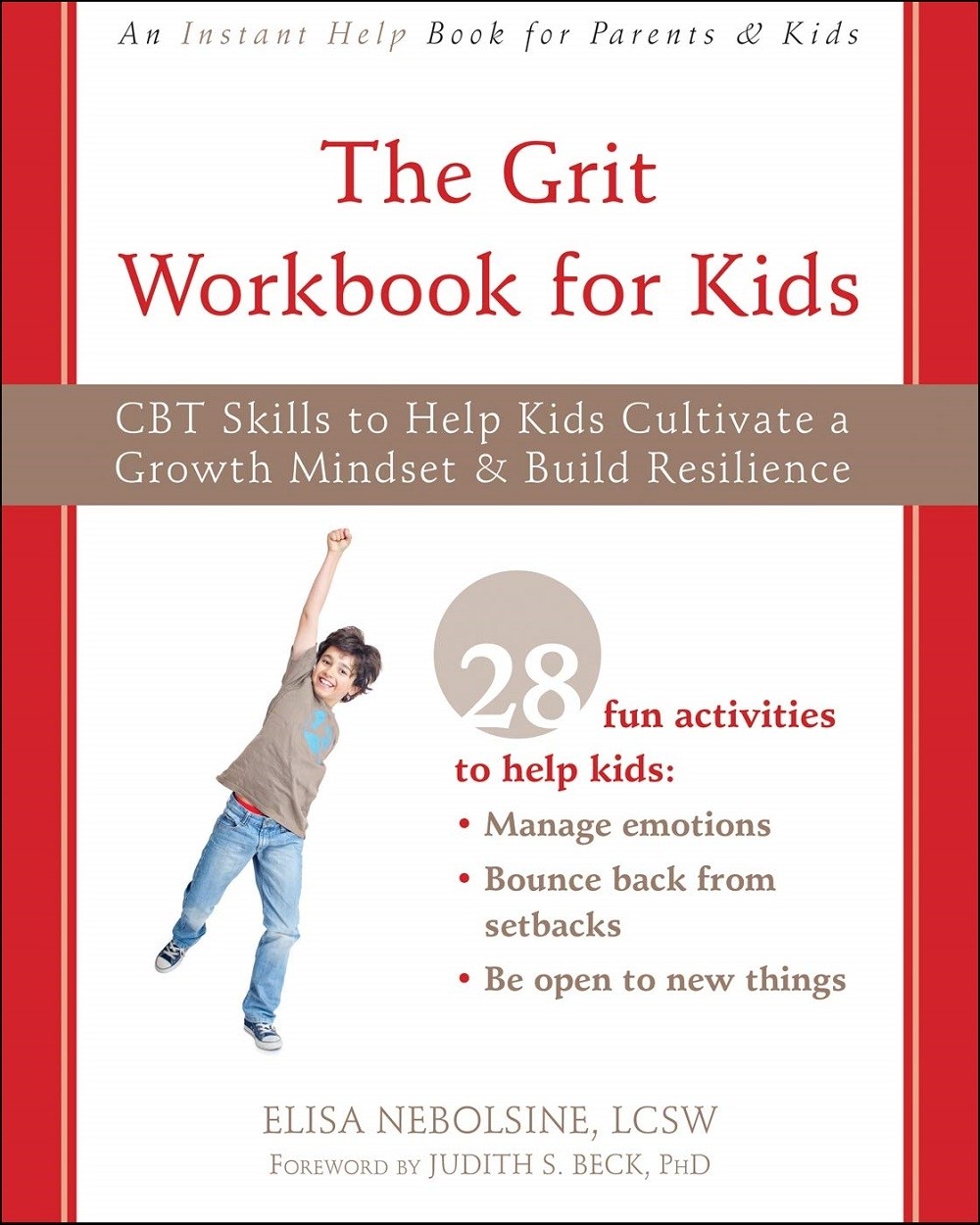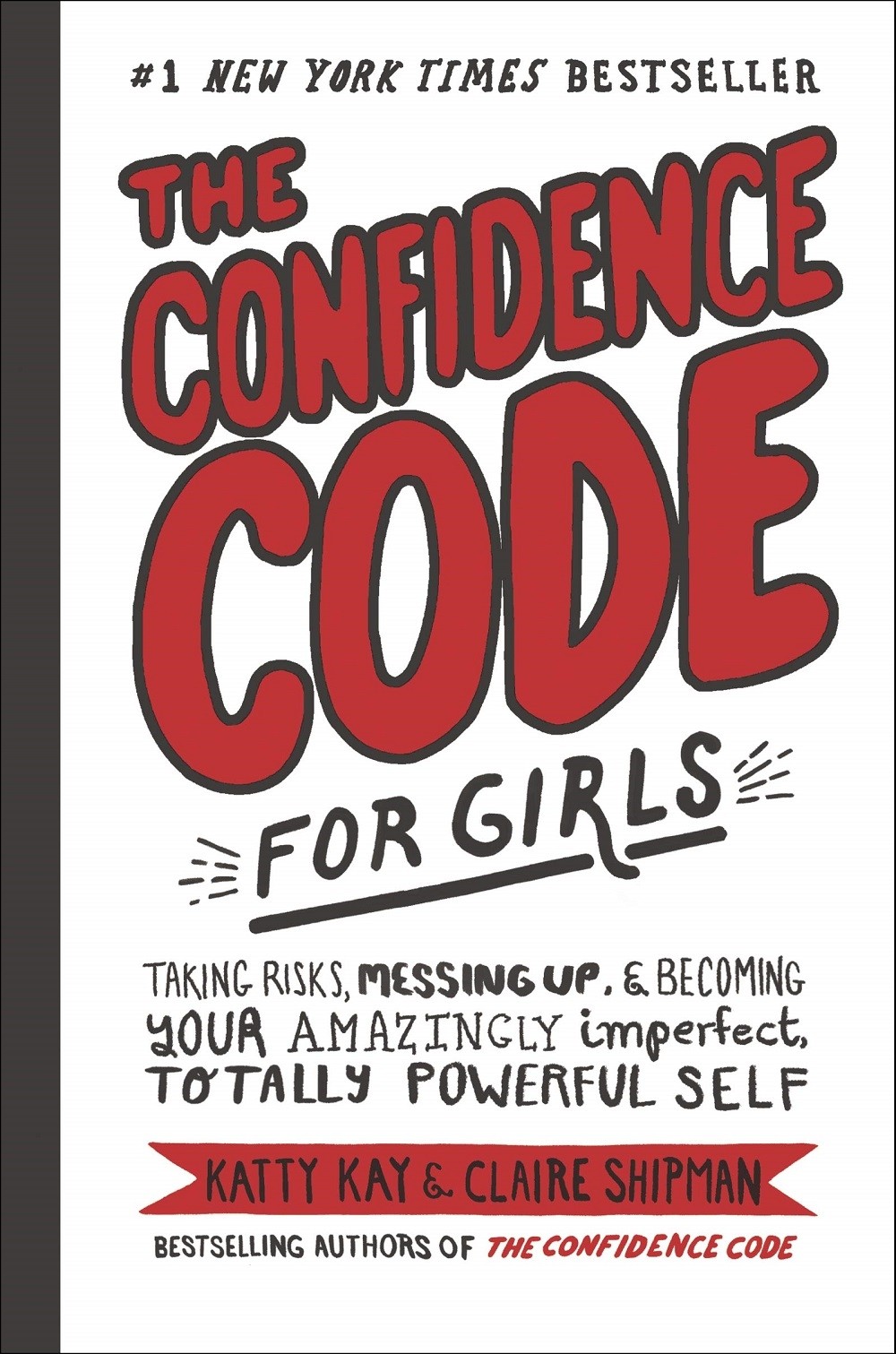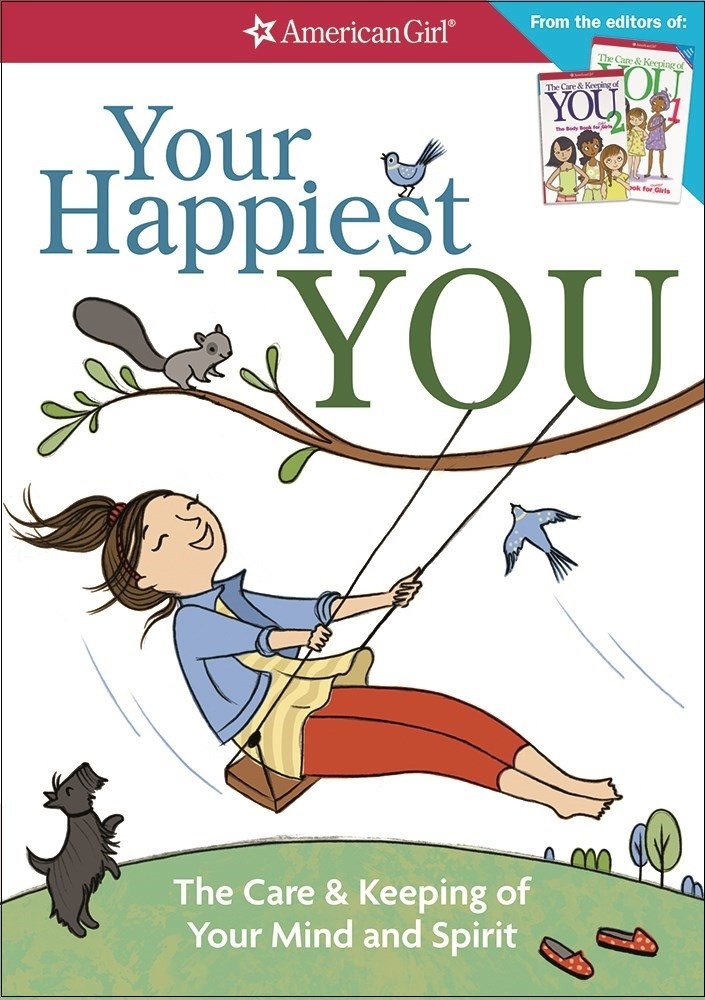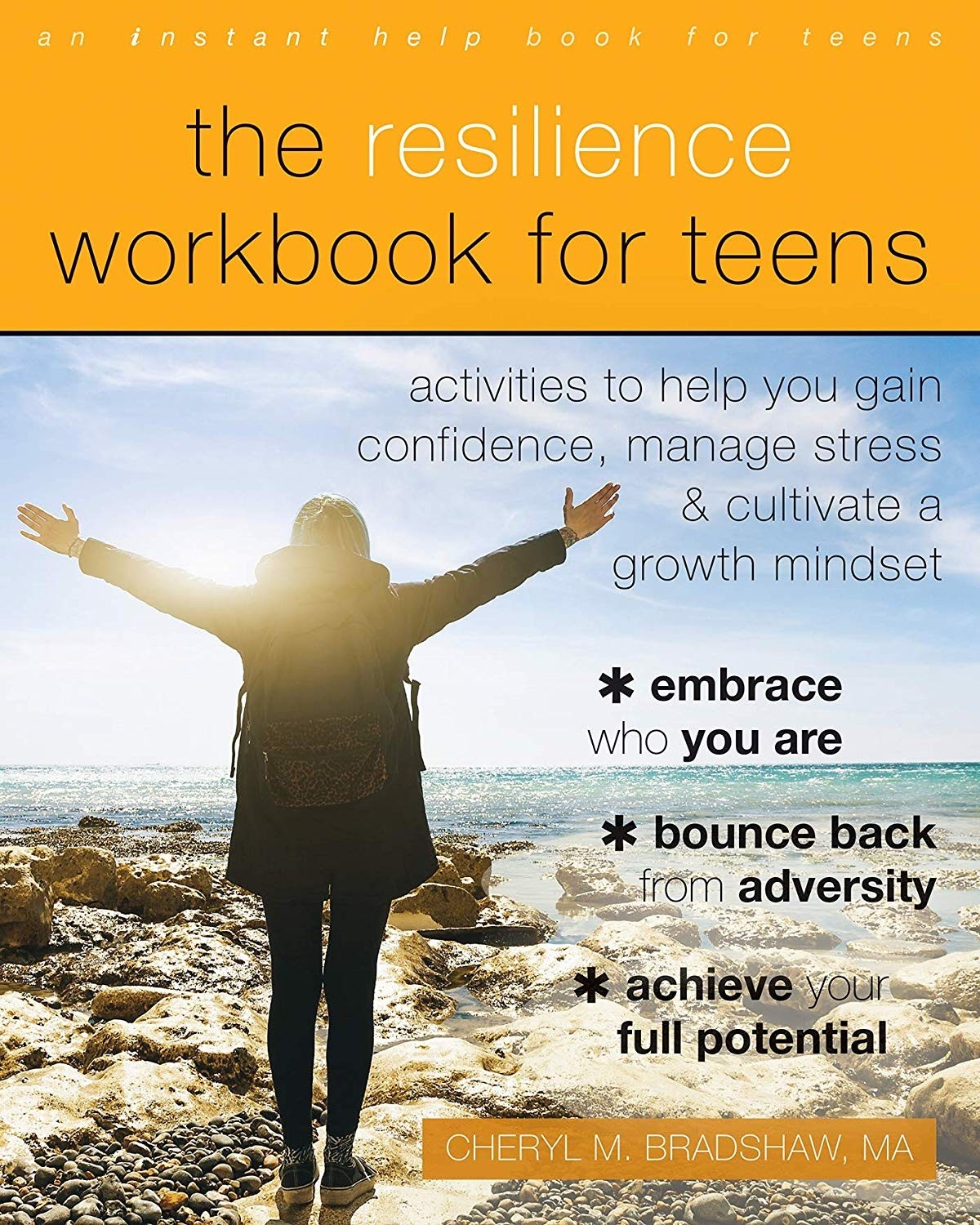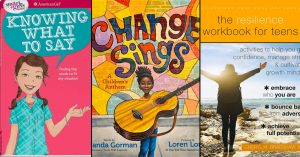The top tips from experts on building girls' resilience to take on challenges and overcome setbacks.
 Call it what you will — grit, determination, a can-do attitude — but it all comes down to the same thing: being able to keep going in the face of challenge and even failure is a major component of a child's future success. "The ability to persist in the face of difficulty may be as essential to success as talent or intelligence,” says psychologist Lisa Damour, Ph.D., author of Untangled: Guiding Teenage Girls Through the Seven Transitions Into Adulthood. Moreover, with research showing that girls are more likely to feel the need to be perfect and to struggle with confidence when they make even small mistakes, it's particularly important to raise resilient girls. As Rachel Simmons, author of Enough As She Is, explains: "What we want is for girls to have is the capacity to move through a setback without beating themselves up."
Call it what you will — grit, determination, a can-do attitude — but it all comes down to the same thing: being able to keep going in the face of challenge and even failure is a major component of a child's future success. "The ability to persist in the face of difficulty may be as essential to success as talent or intelligence,” says psychologist Lisa Damour, Ph.D., author of Untangled: Guiding Teenage Girls Through the Seven Transitions Into Adulthood. Moreover, with research showing that girls are more likely to feel the need to be perfect and to struggle with confidence when they make even small mistakes, it's particularly important to raise resilient girls. As Rachel Simmons, author of Enough As She Is, explains: "What we want is for girls to have is the capacity to move through a setback without beating themselves up."
If you'd like to help your Mighty Girl develop that confidence and resilience, you may be wondering where to start. Fortunately, there are a number of proven ways that parents can foster perseverance and determination in their girls, and in this blog post, we've shared seven of our top tips to raise resilient girls. At the end of the post, we've also featured a few of our favorite books to help girls feel ready to take on the challenges before them, and to help parents and educators foster the resilience girls need to succeed. With the guidance of caring adults, girls will know that they can tackle any obstacle — and come out the other end stronger.
Seven Tips for Raising Resilient Mighty Girls
Foster a growth mindset
Psychologist Carol S. Dweck developed the concept of growth mindset — the attitude that abilities can be practiced and developed, rather than being unchangeable — in the 1980s. Through her research, she discovered that girls tend to think of their abilities are fixed, that is, that people are born with a particular ability or talent of they aren't. As a result, girls are more inclined to give up when they encounter challenges with a particular task or area of study, believing they don't have the ability to improve.
Heidi Grant Halvorson, the author of Nine Things Successful People Do Differently, theorizes that this tendency arises from the way we praise girls: "girls, who develop self-control earlier and are better able to follow instructions... are told that we are 'so smart,' 'so clever,' or 'such a good student,'" she says. "[These phrases imply] that traits like smartness, cleverness, and goodness are qualities you either have or you don't."
So fostering a growth mindset early on helps build the resilience and persistence girls need to tackle bigger tasks later. In her book Mindset: The New Psychology of Success, Dweck suggests praising effort rather than intelligence or success, using phrases such as, “I like the way you tried all kinds of strategies on that math problem until you finally got it right.” When a girl is struggling, she suggests parents and teachers focus on encouraging perseverance and emphasizing her ability to learn: “We all have different learning curves. It may take more time for you to catch on to this and be comfortable with this material, but if you keep at it like this you will.”
Teach them to assess their abilities realistically
It's hard to be resilient when you believe you're performing below expectations — and many girls set a bar that's far too high, Simmons says: "In any case when you expect yourself to be perfect, you will always have an enduring sense that you are not perfect enough." If only perfection is acceptable, girls will be quick to abandon something that pushes their limits. The hallmarks of perfectionism are excessively high personal standards — "I have to excel at everything I do" — and severe self-criticism — "I’m a complete failure if I fall short." To tackle these destructive thoughts, parents need to help girls to develop a realistic assessment of their strengths and their weaknesses, as well as an understanding that everyone makes mistakes.
Angela Duckworth, the author of Grit: The Power of Passion and Perseverance, encourages parents to help girls be aware of and examine their own thoughts, a technique called metacognition. Using metacognitive techniques, she says, allows kids to "look at themselves and honestly understand what they’re doing well and what they’re not doing well... Eventually, they will mediate their weaknesses and raise their strengths." This process of understanding how negative thoughts can hold you back will sound familiar to many adult women, assert Katty Kay, Claire Shipman, and JillEllyn Riley, authors of The Confidence Code for Girls — so "if girls can start to see that pattern at age 10 or 11, imagine... the confidence they could start building."
Let them challenge themselves — even if they struggle
When girls take on a tough task, parents face their own challenge: allowing them to do it, even if they struggle. Jessica Lahey is the author of The Gift of Failure: How the Best Parents Learn to Let Go So Their Children Can Succeed, and as a parent herself, she understands how hard it is to watch kids try — and fail — to do something new. "We bring a beautiful, precious child into the world, and after those first few moments of bliss wear off, we realize that our new purpose in life is to protect this fragile human being from harm," she says. "It's easier to self-soothe by shielding our kids from all risk than to take a pause and figure out which risks are necessary to their development and emotional health." So when a child wrestles with something new, whether it's a toddler trying to put on her jacket or a teen sobbing over a tough assignment, parents may feel like they should sweep in and "fix" the situation.
In the process, however, we inadvertently teach kids that we don't believe that they're capable of handling these tasks, or the emotions surrounding them, on their own. Parents have to let kids wrestle with things, and give them the space and time to do that; if your Mighty Girl is learning to zip a jacket or tie her shoes, you can't plan to be out the door in five minutes flat every day. When they are struggling, tell them that you're confident they can get it — if they keep trying. "With a little luck, they will look back on their childhood and thank us," Lahey says, "not just for our unwavering love, but for our willingness to put their long-term developmental and emotional needs before their short-term happiness. For our willingness to let their lives be just a little bit harder today so they will know how to face hardship tomorrow."
Know when and how to step in
Sometimes, though, parents will have to offer some help. But how do you know when to give kids a hand — and what to offer? The first step is ensuring that your help is welcome by asking, "Do you want help figuring this out?" But if they say yes, it's important not to just feed them the answers, so brainstorm with them or point them to resources they can access themselves. "You need to break down big goals into smaller and smaller parts, and then you need to give them the part that they’re almost able to do, and with support can do." says Duckworth. "If you look at little kids who are learning to walk or learning to read, they might not be able to take the next developmental step on their own, but with a little support this next step becomes just within their reach."
Michael Ungar, author of Too Safe For Their Own Good, says that as kids get older, "the parent [should offer] to share information about the adult's life experience... [but] the choice for how the child behaves [should be] up to the child." After you've shared your take on a situation, step back again: "We sometimes need to insist they make mistakes, or at least what looks like a mistake to us. We need to say, 'Go ahead, you can buy that. It will use up all your savings, but if it is important to you, then do it.'" The long-term cost of their decisions are lower when kids are younger, he points out; "It is better to watch a child mismanage fifty dollars than mismanage five hundred dollars when they're a teenager, or worse, five thousand dollars when they're in their twenties." Letting kids make the decision for themselves allows them to learn from their own mistakes while also giving them the confidence that you know they can handle taking on increasing responsibility.
Have them show you their plan
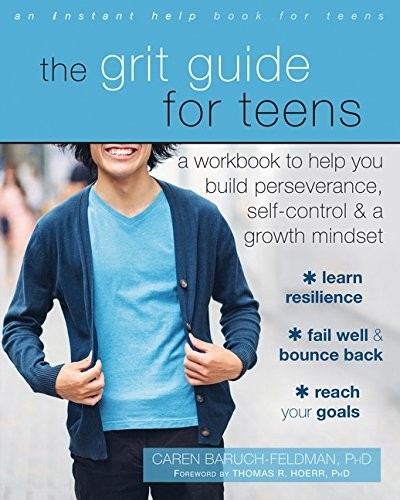 Often the biggest problem is that kids want to take on bigger challenges than the parents are ready for! "Catrina, the eldest daughter of friends of mine, worried her family sick when she packed up her knapsack and, at the youthful age of seventeen, used her own savings to pay her way to Europe," Ungar recalls. But as he points out, if her parents had stopped her, they would have told this resourceful girl that they didn't think she was capable of her "trip of a lifetime." So her parents asked her to tell them her plan for a number of different scenarios, and insisted she add a few details to it: "Catrina agreed to check in with a friend of the family's who lived in England, and the niece of a neighbor who was working in Germany. And she'd call, as often as possible."
Often the biggest problem is that kids want to take on bigger challenges than the parents are ready for! "Catrina, the eldest daughter of friends of mine, worried her family sick when she packed up her knapsack and, at the youthful age of seventeen, used her own savings to pay her way to Europe," Ungar recalls. But as he points out, if her parents had stopped her, they would have told this resourceful girl that they didn't think she was capable of her "trip of a lifetime." So her parents asked her to tell them her plan for a number of different scenarios, and insisted she add a few details to it: "Catrina agreed to check in with a friend of the family's who lived in England, and the niece of a neighbor who was working in Germany. And she'd call, as often as possible."
Not every family is ready for their child to plan for solo travel, but getting them to lay out how they'll accomplish a big challenge — including problems that could crop up along the way — is confidence-building for kids and reassuring for parents. For a girl who wants to learn to do skateboard tricks, parents could tell her to research what a board and proper safety gear will cost, how she'll save up for them, and where and how she'll learn the basic skills she needs. They can also ask her how she'll deal with deviations to her plan: "If the older kids at the skate park don't want to take the time to teach you, then what will you do?" The process will teach her quite a bit about both her aspiration and her own capabilities.
Model what resilience looks like
What you say is important — but it's critical to practice what you preach! Kids learn about resilience by watching adults in their lives handle tough moments, and discovering that bumps in the road aren't the end of the world. "Be conscious about how you handle uncertainty in the presence of your children, whether it’s making a mistake, losing your keys, getting lost [or] burning dinner," Simmons says. "Focus on how you handle situations that just don’t go your way. Let your child observe you not only managing it, but [also] not beating yourself up."
These opportunities to demonstrate how to handle problems will come up both in everyday life, and in unusual circumstances, like when the family is traveling and you run into a hitch or a delay. When a problem crops up, talk out loud about how you can solve it — and invite her to suggest her own ideas for the plan. Don't hesitate to laugh a bit at your predicament, adds Damour. "If you take yourself too seriously, it makes everything feel unpleasant and anxious,” she says. “Being playful makes the moment easier. Humor reduces stress and contributes to resilience.”
Encourage self-care
Throughout these discussions, don't forget to discuss the importance of teaching self-care; it's difficult to hold up to life's challenges without a good night's sleep, a healthy diet, and time to recharge. For some girls, that may mean encouraging them to give up an activity if they're overscheduled, or allowing them to give up an activity that they are ready to leave behind. For others, it means talking to them about how the state of their body affects their mind and their mood, like highlighting how much more quickly she got frustrated with her homework doing it at 9 at night instead of 4 in the afternoon. Whatever the case, parents should aim to teach girls about the importance of caring for their whole selves.
During the time they take for self-care, parents can encourage girls to develop mindfulness skills, techniques that help them feel present in the moment and recognize bodily sensations and emotions without judgement. Activities like counting breaths or focusing on each sense, one at a time, are much easier to learn when a girl is already calm — but once she's had some practice, she can also do them when she's feeling frustrated or overwhelmed. These skills, Simmons says, allow girls "to lean inside as much as to lean in," something that helps them "practice self-compassion, nourish their most important relationships, and seek support when they need it."
Kids are unknowingly working towards learning resilience through every step of their childhoods — and developing that resilience is a key step towards becoming an independent adult. "The ability to fail is a skill," asserts Simmons. "You’re not going to wake up one day and say, 'now I’m resilient!' Resilience is built over time, with practice, with exposure to challenge." A parent's goal should be to ensure that girls get that time, practice, and exposure, growing each time to take on bigger challenges than they did at the last step. By doing so, Dweck says, you're giving kids a gift that will stand them in good stead throughout their lives: "the best thing [a parent] can do is to teach their children to love challenges, be intrigued by mistakes, enjoy effort, and keep on learning."
Books to Raise Resilient Mighty Girls
I Can Do It Myself!
I Can Do It Myself!
There's nothing a toddler loves more than declaring, "I can do it myself!" This board book from the Empowerment Series celebrates the little — but very big — steps towards independence kids make as they grow out of babyhood, from being tall enough to reach a shelf to choosing your own clothes to being brave enough to splash in the waves at the beach. It's sure to remind young Mighty Girls that they are winning little victories every day as they grow! For another book celebrating a toddler's growing independence, check out I Can Do It Too! for ages 1 to 3.
Sometimes You Win — Sometimes You Learn for Kids
Sometimes You Win — Sometimes You Learn for Kids
Wendy and Wade are Woggleball stars, and they love winning — so when they suffer a disappointing loss, they feel ready to quit. Fortunately, their grandpa encourages them, reminding them that "What you learn from your loss can bring victory!" Best-selling author and motivational teacher John C. Maxwell adapts the life lessons in Sometimes You Win — Sometimes You Learn for young readers in this picture book that encourages a positive attitude to failure and the persistence necessary to achieve your goals.
The Girl Who Never Made Mistakes
The Girl Who Never Made Mistakes
Beatrice Bottomwell has never made even a single mistake in her nine years alive — in fact, her whole town knows her as The Girl Who Never Makes Mistakes. But when she almost makes her first right before the big talent show, she's rattled. Suddenly, she starts avoiding things she used to love, just in case she makes a mistake while she's doing them. However, when the inevitable happens and she does make a — very public and messy — mistake, something amazing happens: she laughs it off! It turns out that life is more fun when you realize that mistakes can be overcome... and that no one is perfect. This charming picture book will encourage kids to shake off their mistakes and get ready to try again.
Resilience
Resilience
Ever since Emmi was a baby, she's been learning new things! She learned how to crawl even though she kept slipping on the floor; how to walk even though she fell and bumped more than once; and even how to swim in the big, scary pool. Even when things took try after try, she kept trying again... and each time, she practiced until she succeeded. Today, Emmi is resilient, independent and courageous. She always tries her best, and even when the going gets tough, Emmi never gives in. Author Jayneen Sanders has created a rollicking rhyming story that celebrates perseverance and resilience, even when it feels like the odds are stacked against you — and even includes discussion questions and activities adults can use to foster resilience in their own kids.
The Most Magnificent Thing
The Most Magnificent Thing
The little girl in this story has an idea in her head for the most MAGNIFICENT thing... so with the help of her puppy sidekick, she collects some bits and pieces and starts building. Except that the result isn't quite as magnificent as she wanted, so she tries again... and again... and again. Eventually, frustration overtakes her, and she not only smashes, pummels, and explodes, she also quits. It's not until she takes a walk with her dog and clears her head that she can see the potential in all her previous design and build something that she really does feel is magnificent. This fun picture book sends a great message to young readers about the importance of persistence.
The Grit Workbook for Kids
CBT Skills to Help Kids Cultivate a Growth Mindset and Build Resilience
The Grit Workbook for Kids
CBT Skills to Help Kids Cultivate a Growth Mindset and Build Resilience
When a kid has grit, they're able to see problem as temporary setbacks, and persevere so they can thrive! Not all kids start out with this empowering mindset, but with a little help, they can build self-control and develop the tenacity they need to achieve their goals. In this workbook, which uses techniques grounded in cognitive behavioral therapy (CBT), kids will learn about the tools and strategies that make up grit — and discover how they can apply them in their everyday lives. With a kid-friendly tone and plenty of tips for supportive adults, this workbook from the Instant Help for Parents and Kids series is the perfect choice for anyone who wants to help kids grow grit.
Growth Mindset Workbook for Kids: 55 Fun Activities to Think Creatively, Solve Problems, and Love Learning
Growth Mindset Workbook for Kids: 55 Fun Activities to Think Creatively, Solve Problems, and Love Learning
When you have a growth mindset, you'll know that you can take on any challenge! In this creative workbook for kids, young readers will find engaging exercises and success stories from real-life kids that help them understand the value of a "can-do" attitude, develop problem solving skills, and appreciate the power of practice and perseverance. Kids will discover how their mind is like a muscle, which can expand when you mentally work out, and how mistakes are just steps along the path to success. With a glossary and additional resources for both kids and adults at the back, this book has everything you need to start her on a path to her new mindset.
The Confidence Code for Girls
Taking Risks, Messing Up, and Becoming Your Amazingly Imperfect, Totally Powerful Self
The Confidence Code for Girls
Taking Risks, Messing Up, and Becoming Your Amazingly Imperfect, Totally Powerful Self
Many girls are consumed by self-doubt on the inside, especially during the tween and teen years — but if they can crack the confidence code, they can learn how to set worries aside and focus their energy on what's really important: confidently pursuing their dreams and embracing their authentic selves! In this book, Katty Kay and Claire Shipman, the authors of the best-selling The Confidence Code for adult women, draw on the latest research to help tweens understand how to short-circuit the thoughts that drain your confidence and hold you back. Illustrations throughout help draw girls into the book, while lists, quizzes, and stories from real-life girls help readers understand how to embrace risk (and failure), overcome anxieties, and be happy in their own skins. Girls will also enjoy the companion journal which will help them put these skills into practice, as well as Living The Confidence Code, which shares the stories of 30 real girls pursuing their passions.
Your Happiest You: The Care and Keeping of Your Mind and Spirit
Your Happiest You: The Care and Keeping of Your Mind and Spirit
If you've read The Care and Keeping of You, you already know a lot about caring for your body — but your mind and spirit need care too! In this new book from the American Girl Library, you'll learn important skills for long-term happiness: how to focus on what really matters to you, how to bounce back after a setback, how to find calm inside, and how to connect with the people you love. It also shows how you can make your happiness "contagious." Friendly, accessible advice and stories from real girls just like you remind young readers that happiness doesn't just happen; it's something you can learn.
Sometimes You Win — Sometimes You Learn for Teens
Sometimes You Win — Sometimes You Learn for Teens
The greatest leaders and achievers know that no progress happens without problems, failures, and losses! John C. Maxwell, author of the bestselling adult book Sometimes You Win — Sometimes You Learn, adapts his advice for teen readers in this book that draws on the stories of people who overcame adversity to reach their goals, including entrepreneur Steve Jobs, Olympic Gold Medalists Gabby Douglas and Mikaela Shiffrin, and Nobel Peace Prize nominee Malala Yousafzai. With the right attitude to failure, you can become a true learner; this book shows you how.
The Resilience Workbook for Teens
Activities to Help You Gain Confidence, Manage Stress, and Cultivate a Growth Mindset
The Resilience Workbook for Teens
Activities to Help You Gain Confidence, Manage Stress, and Cultivate a Growth Mindset
The teen years bring lots of challenges — and they're also a critical time for building positive strategies for handling setbacks, struggles, and the tough emotional moments that are a part of everyone's life. In this workbook from the Instant Help Solutions series, psychotherapist and youth mentor Cheryl M. Bradshaw teaches teens how to build a positive relationship with themselves, one which helps them believe in their ability to handle whatever life has to throw at them. Interactive activities and evidence-based practices help teens build the resilience they need to survive and thrive, both now and for the rest of their lives.
Conquer Negative Thinking for Teens
A Workbook to Break the Nine Thought Habits That Are Holding You Back
Conquer Negative Thinking for Teens
A Workbook to Break the Nine Thought Habits That Are Holding You Back
Negative thinking habits can lead teens to develop a distorted view of themselves and others, leaving them feeling anxious, angry, and sad. Fortunately, it's possible to learn to recognize these habits — whether it's the "I can't" habit, the "zooming-in-on-the-negative" habit, the "mind-reading habit", or any of the other common negative thinking habits — and develop more helpful ways of thinking that can help teens gain perspective, resiliency, and self-confidence. Psychologist Mary Karapetian Alvord and writer Anne McGrath provide sections addressing the emotions and bodily sensations that are commonly associated with each habit. Filled with real-life examples, the guide gives teens a step-by-step action plan on how to take control of their thinking and their lives.
The Grit Guide for Teens
A Workbook to Help You Build Perseverance, Self-Control, and a Growth Mindset
The Grit Guide for Teens
A Workbook to Help You Build Perseverance, Self-Control, and a Growth Mindset
Want to power through the challenges in your life and achieve your goals? Then you need grit! The term "grit" encompasses all the attributes you need to accomplish what you want, from tenacity to self-control to the ability to bounce back from failure. This guide introduces teens to the concepts of grit and growth mindset — focusing on improvement and hard work — and shows them how these ideas can translate into turning disappointment into opportunity, embracing challenges, managing stress, and more. After all, life isn't necessarily about being the best of the best; it's about being the best YOU that you can possibly be!
Thrivers: The Surprising Reasons Why Some Kids Struggle and Others Shine
Thrivers: The Surprising Reasons Why Some Kids Struggle and Others Shine
Today's kids are often higher achieving than ever before — but they're also experiencing record levels of stress, anxiety, and depression. And yet some kids seem to thrive rather than burning out — and Dr. Michele Borba, an educational psychologist and the author of the bestselling UnSelfie: Why Empathetic Kids Succeed in Our All-About-Me World, wanted to find out why. She discovered that there are seven character traits — confidence, empathy, self-control, integrity, curiosity, perseverance, and optimism — that help kids bounce back from challenges and succeed, and be happy, in their lives. Better yet, these are traits that we can teach our kids at any age! This must-read book will help parents and educators teach kids these skills so they, too, can thrive.
The Gift of Failure
How the Best Parents Learn to Let Go So Their Children Can Succeed
The Gift of Failure
How the Best Parents Learn to Let Go So Their Children Can Succeed
As a parent, it's easy to fall into the instinct to protect your child from hurt — even if that means the disappointment and frustration that comes from failing. But as teacher and writer Jessica Lahey explains, how to fail — and how to get up, dust yourself off, and try again — is a key skill that kids need to learn young, when the stakes are still low. In her book, Lahey lays out the case for allowing kids to fail, and to feel the full emotional brunt of that failure, and shows parents how to model and teach resiliency and problem-solving. Individual chapters target particular challenges like homework, report cards, and sports. This celebration of the value of reaching high and missing the mark will make you think differently about how you respond to your child's mistakes and problems.
Untangled: Guiding Teenage Girls Through the Seven Transitions Into Adulthood
Untangled: Guiding Teenage Girls Through the Seven Transitions Into Adulthood
If the job of an adolescent is to become an adult, how do you know when they're there? Lisa Damour, director of the Laurel School's Center for Research on Girls, draws on the latest research to reveal the seven key transitions — including Parting with Childhood, Contending with Adult Authority, Entering the Romantic World, and Caring for Herself — that an adolescent girl needs to make before she reaches adulthood. Equally importantly, she shows how uneven progress through these transitions explains the sometimes erratic behavior of teenage girls, and how parents' responses can help strengthen their relationship so she can complete her journey healthy and happy.
Enough As She Is
How to Help Girls Move Beyond Impossible Standards of Success to Live Healthy, Happy, and Fulfilling Lives
Enough As She Is
How to Help Girls Move Beyond Impossible Standards of Success to Live Healthy, Happy, and Fulfilling Lives
Although girls seem to be more "successful" than ever today, outpacing boys in GPA, college enrollment, and more, they're also reporting feeling overwhelmed by the need to be exceptional at everything. This book takes a look below the put-together surface that girls project to the world, and provides practical tips for parents to help them reduce negative thoughts, embrace risk and authenticity, and prioritize feeling confident and happy as the ultimate sign of success. Best-selling parenting author Rachel Simmons relies on in-depth case studies and careful research to create both a portrait of the challenges facing girls today and a road map to help girls create their own paths to happy, healthy lives.

What makes the difference between someone who perseveres until they succeed, and someone who gives up? The answer is mindset! Stanford University psychologist Carol S. Dweck has conducted decades of research into how mindset affects performance, and in her book she talks about how developing a growth mindset — the belief that abilities can be developed — helps set the stage for achievement. A selection of case studies highlight the differences between fixed and growth mindset, while the included tips can help parents and educators foster growth mindset in both individuals and communities, so that everyone can reach their full potential.

Many people think that talent is the key to success — but we all know talented people who never live up to their potential, and people who thrive despite enormous obstacles. Celebrated researcher and professor Angela Duckworth says that the difference is grit, a combination of passion, perseverance, and drive that can push people to achieve heights they'd never thought possible. In her best-selling book, she lays out what she's learned from high-achievers and reminds readers that grit can be learned, and how what you think when you fall down determines whether, and how quickly, you get back up again. This fascinating and inspiring book is an important reminder of the power of persistence and practice.









